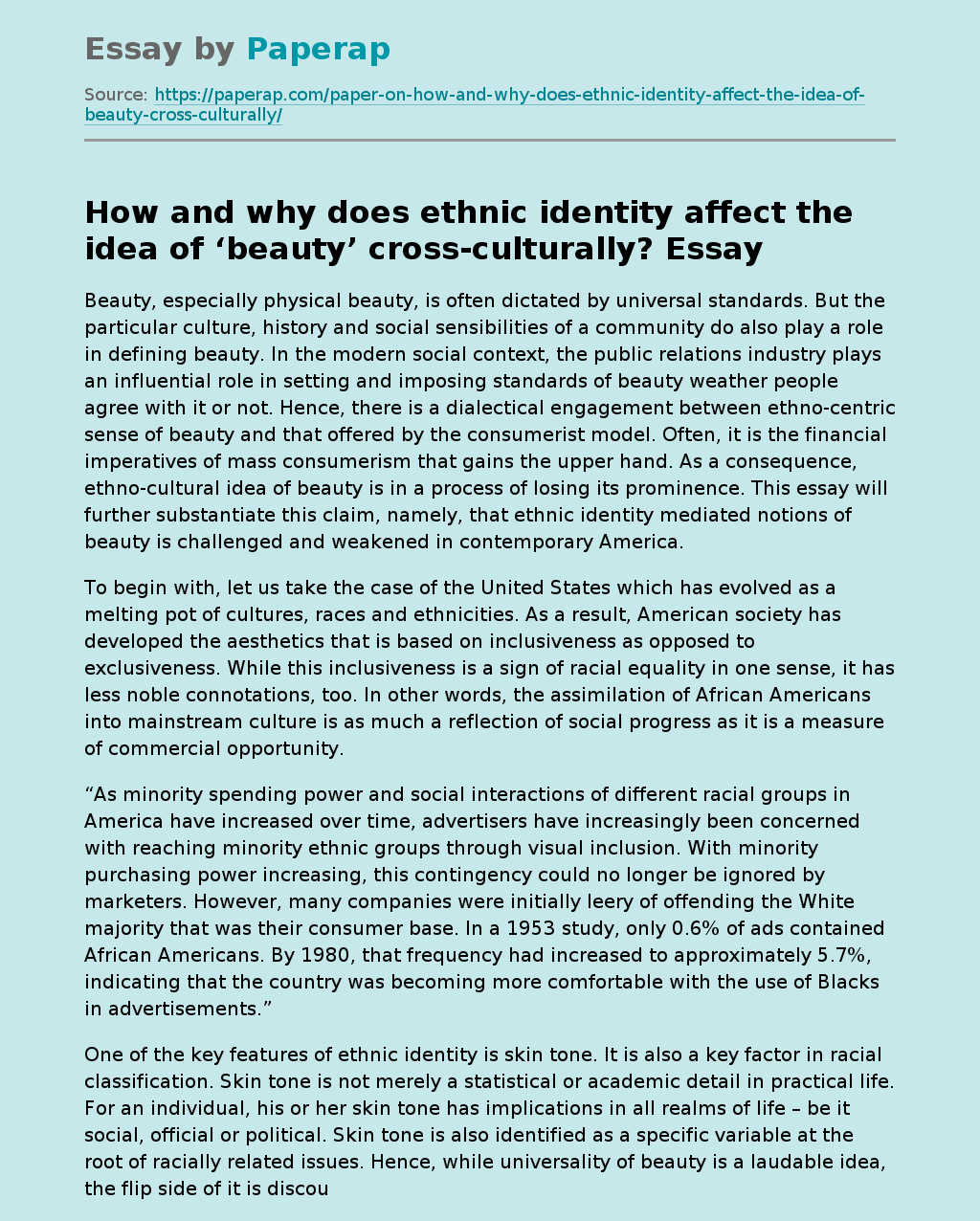How and why does ethnic identity affect the idea of ‘beauty’ cross-culturally?
Beauty, especially physical beauty, is often dictated by universal standards. But the particular culture, history and social sensibilities of a community do also play a role in defining beauty. In the modern social context, the public relations industry plays an influential role in setting and imposing standards of beauty weather people agree with it or not. Hence, there is a dialectical engagement between ethno-centric sense of beauty and that offered by the consumerist model. Often, it is the financial imperatives of mass consumerism that gains the upper hand.
As a consequence, ethno-cultural idea of beauty is in a process of losing its prominence. This essay will further substantiate this claim, namely, that ethnic identity mediated notions of beauty is challenged and weakened in contemporary America.
To begin with, let us take the case of the United States which has evolved as a melting pot of cultures, races and ethnicities. As a result, American society has developed the aesthetics that is based on inclusiveness as opposed to exclusiveness.
While this inclusiveness is a sign of racial equality in one sense, it has less noble connotations, too. In other words, the assimilation of African Americans into mainstream culture is as much a reflection of social progress as it is a measure of commercial opportunity.
“As minority spending power and social interactions of different racial groups in America have increased over time, advertisers have increasingly been concerned with reaching minority ethnic groups through visual inclusion. With minority purchasing power increasing, this contingency could no longer be ignored by marketers.
However, many companies were initially leery of offending the White majority that was their consumer base. In a 1953 study, only 0.6% of ads contained African Americans. By 1980, that frequency had increased to approximately 5.7%, indicating that the country was becoming more comfortable with the use of Blacks in advertisements.”
One of the key features of ethnic identity is skin tone. It is also a key factor in racial classification. Skin tone is not merely a statistical or academic detail in practical life. For an individual, his or her skin tone has implications in all realms of life – be it social, official or political. Skin tone is also identified as a specific variable at the root of racially related issues. Hence, while universality of beauty is a laudable idea, the flip side of it is discouraging. For example, researchers have correlated skin tone with “feelings of self worth, attractiveness, self control, satisfaction, and with quality of life.” The theory of ‘colorism’ is of salience here, which states that people of lighter-skin tone (across ethnicities) are given privilege over dark-skinned members of the same community. The interesting finding here is the applicability of this concept across and between ethnic groups. For example,
“African American’s tend to feel more favorable towards Black models with a lighter skin tone. This phenomenon is not exclusive to African Americans because colorism is concerned with actual skin tone, as opposed to racial or ethnic identity. Research done by Shyon Baumann (2008) has shown that people within our culture, regardless of race, have a set of ideals about how people should ideally look, including judgments regarding skin color. Lightness and darkness of skin tone have specific meanings attached to them and we subconsciously relate those meanings to those we encounter.”
The statistical veracity of the theory of colorism is a setback to ethnically identified notions of beauty. It is a serious dent to the preservation of authenticity and nativity in an atmosphere saturated with uniformity and conformity. There are qualifications to the theory of colorism though for people with strong ethnic identification feel more affinity towards a model which resembles their own features. Likewise, black consumers generally respond well to advertisements featuring black models compared to models of other ethnicities. What is important from a sociological viewpoint is the fact that “one’s level of ethnic identity may dictate his/her preference for and judgments about their group. In terms of skin color, this stream of research suggests that Blacks who identify strongly with their ethnicity will feel more positively towards darker models than will Blacks who identify less with their ethnicity.”
A study of Chinese American women born and brought up in the Chinatowns of major cities in the United States offers key insights into the topic. The annual Miss Chinatown USA Beauty Pageant event is well-attended by the community. The competition seeks to find “the most beautiful Chinese girl with the right proportion of beauty, personality and talent.” As one winner of the competition explained, the pageant was not as much as beauty contest as it is ‘a matter of ethnic representation.’ Hence, beauty, in an ethnic context, can be a force of solidarity and an expression of collective pride. Ever since the success of the first edition of Miss Chinatown U.S.A., the beauty pageant had become an integral part of the Chinese New Year celebrations in the country. As one organizer of the event elaborated, the celebrations would have no focus otherwise:
“no pageant, no coronation ball, no Miss Chinatown float for the annual parade, and no fashion show. These Chinese New Year events draw hundreds of thousands of tourists into San Francisco’s Chinatown, serving the dual purposes of educating the public about Chinese American culture and attracting business for Chinatown merchants.”
What is noteworthy about Miss Chinatown USA contest is its unique expression of ethnic pride. Whereas ethnic beauty is largely studied today in the context of targeting a particular niche market, Miss Chinatown USA has fought this tendency and has served to promote tourism and celebrating Chinese culture. Due to the reach and importance of the event, it is interesting to analyze it as a way of gaining insights into
How and why does ethnic identity affect the idea of ‘beauty’ cross-culturally?. (2019, Feb 25). Retrieved from https://paperap.com/paper-on-how-and-why-does-ethnic-identity-affect-the-idea-of-beauty-cross-culturally/

